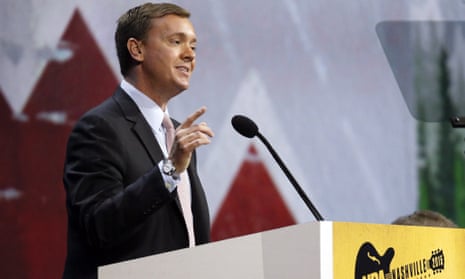The National Rifle Association and its two arms for lobbying and campaign contributions may have systemically violated political spending law, a new report claims.
Exploring the labyrinthine world of campaign finance and tax law, a Yahoo news investigation has found the gun rights organization may have broken the law while fundraising and reporting its spending.
Although the NRA advertises the opportunity to contribute to its Institute for Legislative Action (ILA) – the arm that actively lobbies members of Congress – a credit card statement showed that a donation to the organization actually went to the NRA’s political action committee (Pac), the Political Victory Fund (PVF). While the NRA cannot directly give money to political candidates, its Pac can.
Federal law states that an organization such as the NRA cannot solicit money for itself and then deliver that money to its Pac – an action that obscures the beneficiary of a donation from the donor.
To misrepresent a solicitation in this way verges on fraud, attorneys say.
“I simply cannot see how this is legal,” Larry Noble, senior counsel at the Campaign Legal Center, told the Guardian. “It is impossible to see how they are soliciting funds the way they’re soliciting, and putting those funds in their political action committee, without violating the law.”
“I can’t believe they’re being incredibly sloppy,” Noble continued, “they are sophisticated, they’ve been playing this field for a very long time.” A former general counsel for the Federal Election Commission (FEC), he noted that the NRA had run afoul of the law years ago for transferring funds to its lobbying arm.
An NRA spokesperson did not immediately respond to questions about the organization’s donation system or solicitations.
A Pac that makes political contributions “is effectively a separate bank account” from an affiliated corporation, Noble said. “You have to keep the money separate and the Pac has to follow the courts and the rules.” The NRA appears to have mixed its corporate funds and with its Pac funds and general solicitations, he said.
Even when a Pac solicits donations for itself, it must explain where those donations will go. Law requires the Pac to say a donation will be used to influence a federal election, to provide a disclaimer that contributions must be voluntary, and to collect donor information, such as address, employer and occupation.
The NRA-ILA donation site requires donors give little more than credit card information, and offers no more context than a link to a fine-print disclosure statement, which in turn mostly tells a donor that their contribution is not tax-deductible as charity, and where the donor can find NRA financial documents in every state.
Another possible violation of law is that the NRA offers the general public a chance to give to its Pac at all. The Federal Election Campaign Act only allows organizations like the NRA to solicit for Pacs from their employees and members, but the website of the NRA’s Pac did not require donors to log in as NRA members. The PVF page also advertised donations to the ILA but in fact delivered money back to itself.
The organization may have broken the law also in that it told the IRS it did not “engage in direct or indirect political campaign activities on behalf of or in opposition to candidates for public office”. The nonprofit does report such activity to the FEC, and frequently broadcasts its political might to both voters and elected leaders.
A spokesperson for the FEC, the regulatory body that oversees campaign finance, said the commission has no comment and directed concerns to the official complaint system.
Although the IRS would not necessarily tax the NRA for all its spending, the NRA still must report that spending, in part so that the IRS can decide whether the nonprofit ought to keep its tax-exempt status. Similarly, although the NRA can spend on fundraising and administration for its Pac – records show it spent more than $23m on it between 2007 and 2013 – it cannot simply put money in the Pac’s war chest.
The IRS, whose budget to audit and investigate wrongdoing has been slashed to a fraction of its size a decade ago, may not have the resources or will to pursue the NRA. Handicapped by anti-tax Republican lawmakers who control Congress, it is also struggling with fallout from revelations that its leaders targeted conservative groups for audits.
The NRA ranks among the top political spenders in the nation, having spent more than $3m on lobbying in 2014 and more than $28m on “outside spending” – the kind of political spending that is not technically coordinated with candidates’ committees. Candidates receive contributions from the NRA’s Pacs that are more than 76 times larger than contributions from individuals, according to the Center for Responsive Politics.

Comments (…)
Sign in or create your Guardian account to join the discussion